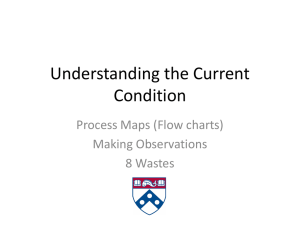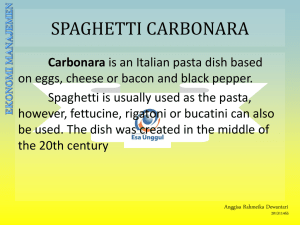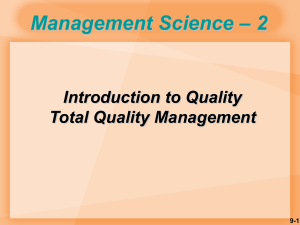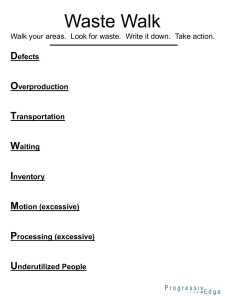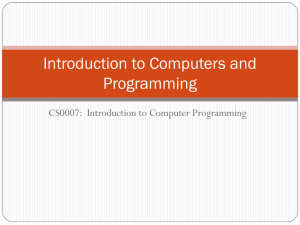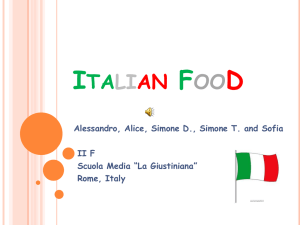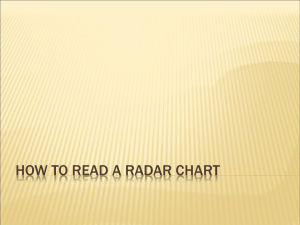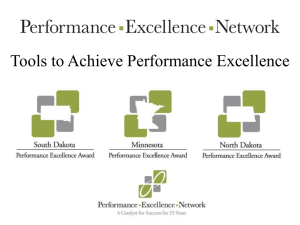Module 3 - UCLA Health
advertisement
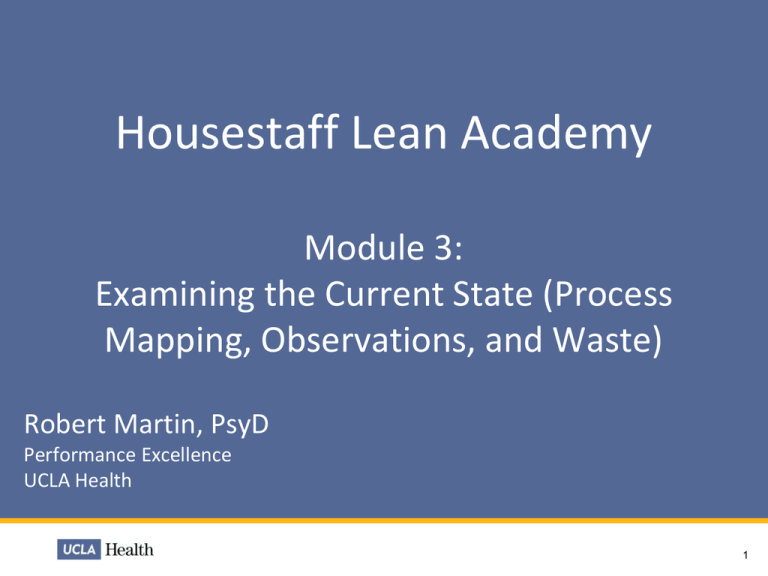
Housestaff Lean Academy Module 3: Examining the Current State (Process Mapping, Observations, and Waste) Robert Martin, PsyD Performance Excellence UCLA Health 1 Where does this module fit into the curriculum? Module # Module Description 1 Lean Principles for Physicians (Important Concepts) 2 Using A3* and PDCA Methodology for your improvement project(s) 3 Examining the Current State (Process Mapping , Observations, & Waste) 4 How to use Root Cause Analysis 5 Organizing & Using Data 6 Identifying Improvements & Actions (A3 Simulation) 7 Working as a Team (Frontline Empowerment & Engagement) 8 Sustaining Improvements through Standard Work 9 Understanding & Leading Change 10 UCLA Operating System - Supporting Infrastructure (ADM, Huddles, A3/A4 Methodology) 2 Module 1 Summary Value Use these concepts to focus your improvement project Waste Scientific Method (PDCA / A3) Use the A3 and PDCA methodology (i.e. scientific method for improvement) to manage and communicate your improvement project Empowered Staff Alignment Use these concepts to maximize your improvement project’s chance for success 3 Module 2 Summary A3-Problem Solving (11 x 17) Use for: • Complex problems • Gaining consensus • Communicating • Managing the project Use if: • Root Causes to problems are unknown • Solutions aren’t obvious Requires Planning (PDCA) and data collection & analysis 4 Documenting the Current State is beneficial • Idea collection, observations, and discussions of “pain points” engages staff , improves shared understanding and teaming Tools • Illustrates a process or patient pathway from both the staff and patient’s perspectives • The resulting documentation (a process map, observation sheets, spaghetti charts, etc.): • Is easy to understand, highly visual, and aids the change process • Help to identify steps that don't directly contribute to patient care (bottlenecks, constraints, problems/issues = waste) • Help to identify steps that do contribute to patient care (value-added) Process Maps Time Observation Sheets Spaghetti Charts Waste Analysis 5 Process Mapping •A simple language not taught in medical school •Organized visualization of interrelated activities which combine to form a process, patient pathway, or process of care •There are more symbols, but these are the most important: Tools Process Maps Time Observation Sheets Spaghetti Charts •Process Mapping can be mapped in several ways! Waste Analysis 6 Process Mapping (Cross-Functional, or “Swim Lanes”) Tools Process Maps Time Observation Sheets Spaghetti Charts Waste Analysis 7 Process Mapping (Linear/Phased) Where activity takes the longest on this map? Tools Process Maps This might required a more detailed map or Time Observation Sheets Time Observation Sheets Spaghetti Charts Waste Analysis 8 You can use TOS or more detailed Process Maps to further understand problems Using Time Observation Sheets* Multiple Observations Tools Running clock is used Calculations can be done after (i.e. 8:20 – 8:02 = 18 mins) Remarks can be captured for further analysis Process Maps Time Observation Sheets Spaghetti Charts Waste Analysis *Template is available 9 Using Spaghetti Charts* Spaghetti Diagram Area: Step Date: Steps can be copied over from Time Obs. Sheets Description 1 Pt walks into Clinic 2 Scheduler/Registrar checks patient into CareConnect and directs PT to waiting room Process: Distance Distance: Distance can be measured 5 6 7 8 Patient waits for Care Coordinator Care Coordinator calls patient to the back CC verifies PT in CareConnect 1 10 Time Observation Sheets Patient completes consent forms CC reviews forms for errors and completion 4-8 CC directs patient back to waiting room 10 2 3 9 Patient waits for Nurse Nurse calls PT back Tools Process Maps 3 4 You can use Spaghetti Charts to show the impact of motion and movement, and to improve flow 9 Spaghetti Charts 11 12 Waste Analysis 13 14 21 *Template is available 10 While doing observations, you can find more “waste” when you examine with a model*: Process Maps Time Observation Sheets Spaghetti Charts Tools Process Maps 1) Defects • How many defects are the Care Coordinator finding? What is the impact? 5) Transport • Is there any transport waste? 2) Overproduction • Are there any unnecessary forms we ask the patient to fill out? 6) Inventory • Is there any inventory waste? • Patient is waiting at least 24 minutes. Is the MD waiting? Other bottlenecks? 4) Not Utilizing Talent • Can the registrar be trained to do consent if the Care Coordinator isn’t available? 7) Motion 8) Extra-Processing 3) Waiting • Is the PT being moved too much? *Template for practicing 8 wastes is available • Is there any rework from defects or other waste? Time Observation Sheets Spaghetti Charts Waste Analysis 11 You can use TOS or more detailed Process Maps to further understand problems Using Time Observation Sheets* Tools Waiting: Why 18 minutes waiting for the Care Coordinator to do consent forms! Process Maps Not utilizing Talent: Can another function help when CC is doing Plan of Care Scheduling? Overproduction: Are all of the forms necessary? Defects & Extra Processing: Why are their defects? What type? What is the Time Observation Sheets Spaghetti Charts impact of defects? Waste Analysis *Template is available 12 Once the Current State is understood, you can analyze the “root causes” of the waste (next module) to eliminate them Tools Process Maps Pareto Cause & Effect Diagrams 5 Why Analysis Time Observation Sheets Spaghetti Charts Waste Analysis 13 What module is next?* Module # Module Description 1 Lean Principles for Physicians (Important Concepts) 2 Using A3 and PDCA Methodology for your improvement project(s) 3 Examining the Current State (Process Mapping , Observations, & Waste) 4 How to use Root Cause Analysis 5 Organizing & Using Data 6 Identifying Improvements & Actions (A3 Simulation) 7 Working as a Team (Frontline Empowerment & Engagement) 8 Sustaining Improvements through Standard Work 9 Understanding & Leading Change 10 UCLA Operating System - Supporting Infrastructure (ADM, Huddles, A3/A4 Methodology) * Thank you! Please complete your post-questions 14 15
